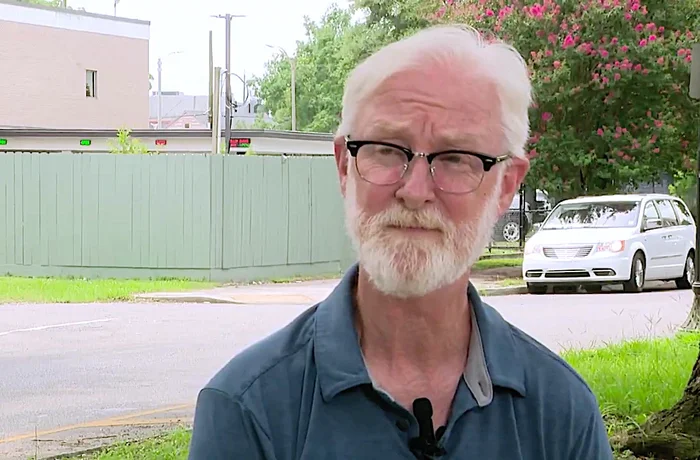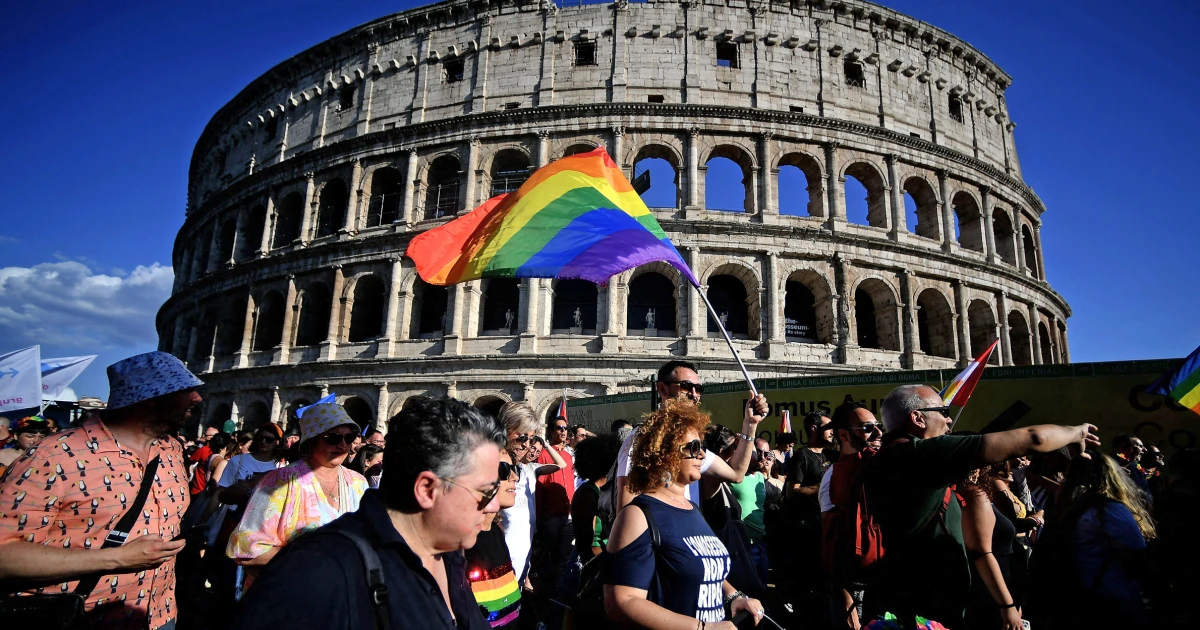Introduction: A Teacher’s Dismissal Ignites Controversy
In the heart of Metairie, Louisiana, a suburb of New Orleans, a beloved music teacher’s dismissal from St. Francis Xavier Catholic School has sparked a heated debate about discrimination, religious doctrine, and the evolving landscape of inclusivity in educational institutions. Mark Richards, a dedicated educator and band director who served the school for over two decades, was abruptly fired in June 2025 after an obituary from nearly two years prior identified him as the widower of his late husband, John Messinger. The decision, rooted in a morality clause embedded in Richards’s employment contract, has drawn widespread attention, both locally and internationally, highlighting tensions between personal identity, institutional policies, and societal change.
Richards’s story is not just about one man’s loss of employment; it is a microcosm of broader issues surrounding the treatment of LGBTQ+ individuals in religious institutions, the selective enforcement of moral codes, and the cultural dynamics of the American South. His refusal to remain silent—“it’s just time” for discrimination to end, as he told Talk Louisiana With Jim Engster—has resonated with thousands, prompting petitions, public outcry, and a reexamination of the policies governing Catholic schools. This expanded account delves into Richards’s journey, the historical and cultural context of his dismissal, and the broader implications for education and civil rights, enriched with verified details and insights into the musical and social fabric of New Orleans.
Mark Richards: A Life Dedicated to Music and Education
A Passion for Teaching
Mark Richards began his tenure at St. Francis Xavier in 2003, bringing with him a deep passion for music and education. As a music teacher and band director, he shaped the lives of thousands of students, fostering creativity, discipline, and a love for the arts. His classroom was a sanctuary where young musicians honed their skills, from mastering scales on the clarinet to performing in school concerts that brought the community together. Colleagues and students alike described Richards as a “beacon of kindness and understanding,” a testament to his ability to connect with others through the universal language of music.
Born in Mississippi, Richards grew up in a region where conservative values often clashed with personal expressions of identity. Despite these challenges, he pursued a career in music education, a field that demands both technical expertise and emotional intelligence. Music, with its roots in human expression and cultural storytelling, became Richards’s medium for inspiring others. His work at St. Francis Xavier was not just a job but a calling, one that he pursued with unwavering dedication for 22 years.
A Personal Journey of Love and Loss
Richards’s personal life was equally significant in shaping his story. In 2001, he met John Messinger, the man who would become his husband. Their relationship, which culminated in marriage in 2014, was a source of joy and stability. However, in September 2023, tragedy struck when Messinger suffered a fatal heart attack, leaving Richards to navigate the profound grief of losing his partner of over two decades. The St. Francis Xavier community, aware of Richards’s loss, initially offered sympathy and support, a gesture that reflected the school’s tight-knit environment.
Yet, this support was not universal. Nearly two years after Messinger’s death, an obituary published in 2023, which listed Richards as Messinger’s widower, became the catalyst for his dismissal. The obituary, a public acknowledgment of their marriage, was brought to the attention of school and archdiocesan officials by a disgruntled parent. This complaint triggered a chain of events that would upend Richards’s career and spark a broader conversation about fairness and equality.
The Morality Clause: A Contentious Policy
Understanding the Clause
At the heart of Richards’s dismissal lies a morality clause included in his annually renewable employment contract at St. Francis Xavier. This clause, mandated by the Roman Catholic Archdiocese of New Orleans for all teachers in its affiliated schools, prohibits educators from engaging in behaviors deemed contrary to Catholic teachings. Specifically, it forbids “a marriage in violation of the rules of the Catholic Church,” “actively engaging in homosexual activity,” or other conduct that conflicts with the Church’s doctrines, which do not recognize same-sex marriage.
Richards, who had been open about his sexual orientation when hired in 2003, signed the contract despite the clause, as he was offered the position regardless of his identity. For years, the clause appeared to be selectively enforced, a common practice in many religious institutions where pragmatic considerations often temper strict adherence to doctrine. However, the complaint about the obituary prompted school officials to invoke the clause, accusing Richards of misrepresenting his lifestyle in previous contract agreements.
Selective Enforcement and Institutional Hypocrisy
The selective enforcement of morality clauses is not unique to St. Francis Xavier. Across the United States, Catholic schools and institutions have faced criticism for applying such clauses inconsistently, often targeting LGBTQ+ employees while overlooking other violations of Church teaching, such as divorce or cohabitation outside marriage. In Richards’s case, the decision to terminate his employment based on an obituary published nearly two years earlier raises questions about the motivations behind the complaint and the school’s response.
Adding to the controversy is the historical context of the Archdiocese of New Orleans, which has faced its own moral challenges. In 2018, the archdiocese released a list of priests and deacons credibly accused of child molestation, a disclosure that shocked the community and led to a bankruptcy filing in 2020, which remains unresolved as of July 2025. Furthermore, past actions by St. Francis Xavier’s leadership, including efforts by former pastor Andrew Taormina to secure the release of a convicted child rapist, Robert Melancon, on medical compassion grounds, highlight a stark contrast with the treatment of Richards. Melancon’s campaign involved VM Wheeler III, an attorney later convicted of child molestation himself, underscoring the complex and sometimes contradictory moral landscape within the archdiocese.
Community Response: Outrage and Support
A Petition for Justice
Richards’s dismissal prompted an immediate and passionate response from the St. Francis Xavier community. Parents, students, and alumni rallied to his defense, launching a petition on Change.org that described him as a “beacon of kindness and understanding” and condemned his firing as “a discriminatory, unkind and intolerant move.” By July 2025, the petition had garnered over 4,500 signatures, reflecting widespread support for Richards and growing frustration with the archdiocese’s policies.
Richards himself took proactive steps to share his story, sending an email to the St. Francis community to explain the circumstances of his dismissal. His transparency and courage resonated with many, who saw his firing as an injustice rooted in outdated prejudices. The petition underscored Richards’s impact as an educator, emphasizing his role in fostering a nurturing environment for students over his 22-year tenure.
“Mark Richards has been a beacon of kindness and understanding in the lives of thousands of students. His dismissal is a discriminatory, unkind and intolerant move.” — Petition statement
School and Archdiocesan Stance
Despite the outpouring of support, St. Francis Xavier and the Archdiocese of New Orleans remained steadfast in their decision. In an email to the school community, officials declared, “This decision is final and will not be revisited,” a statement that further fueled public discontent. The rigidity of the archdiocese’s position contrasted sharply with the community’s call for compassion and reconsideration, highlighting a disconnect between institutional policies and the values of many within the school.
Cultural and Historical Context: New Orleans and the South
New Orleans: A City of Contrasts
New Orleans, with its vibrant cultural heritage and history of resilience, is a city that embodies both tradition and progress. Known for its jazz, Mardi Gras, and Creole cuisine, it is a melting pot where diverse identities have long coexisted, often in tension with conservative religious institutions. The Catholic Church has played a significant role in shaping the city’s identity, with its network of parishes, schools, and charitable organizations. Yet, New Orleans is also home to a thriving LGBTQ+ community, particularly in the French Quarter, where events like Southern Decadence celebrate queer culture.
Richards’s dismissal reflects the broader cultural dynamics of New Orleans and the American South, where progressive values often clash with entrenched religious conservatism. The city’s history of racial and social struggles, from the Civil Rights Movement to post-Hurricane Katrina recovery, underscores its capacity for change, yet challenges like homophobia persist, particularly in religious institutions.
Music as a Cultural Force
As a music teacher, Richards’s work was deeply intertwined with New Orleans’s musical heritage. The city is the birthplace of jazz, a genre that emerged from African American communities and blended European, African, and Creole influences. Music education in New Orleans is not just about teaching notes and rhythms; it is about preserving a cultural legacy that values creativity, collaboration, and expression. Richards’s role as a band director placed him at the heart of this tradition, guiding students to contribute to the city’s musical tapestry.
The loss of Richards as an educator is particularly poignant in this context. Music teachers in New Orleans are not merely instructors but cultural stewards, passing down traditions that define the city’s identity. His dismissal, based on personal identity rather than professional performance, raises questions about the inclusivity of institutions tasked with nurturing the next generation of artists.
Legal and Social Implications
Limited Legal Recourse
Richards’s legal options appear limited, as he was between contracts when his employment was not renewed. In a radio interview with Jim Engster, he acknowledged the challenges of challenging his dismissal, given the private nature of Catholic schools and their ability to set employment conditions based on religious doctrine. A relevant precedent exists in a 2020 federal Fourth Circuit Court of Appeals decision, which upheld a North Carolina Catholic high school’s right to fire a gay teacher for announcing plans to marry his partner. This ruling, grounded in the principle of religious freedom, underscores the legal protections afforded to religious institutions in employment disputes.
Despite these constraints, Richards has consulted an attorney to explore whether the morality clause itself could be challenged. His goal is not only to seek justice for himself but to advocate for broader change, ensuring that future educators are not subjected to similar discrimination.
The Broader Fight Against Discrimination
Richards’s story is part of a larger struggle for LGBTQ+ rights in the United States. The South, with its history of conservative social policies, has been a challenging landscape for queer individuals. Growing up gay in Mississippi, Richards experienced firsthand the “bullying and discrimination” that he now seeks to end. His dismissal highlights the ongoing tension between religious institutions and civil rights, a debate that has gained urgency in recent years as same-sex marriage and LGBTQ+ protections have become more widely accepted.
Nationally, the legalization of same-sex marriage in 2015, following the Supreme Court’s Obergefell v. Hodges decision, marked a significant milestone. However, religious exemptions continue to allow institutions like Catholic schools to enforce policies that conflict with broader societal shifts toward inclusivity. Richards’s case underscores the need for continued advocacy to bridge this gap, ensuring that individuals are judged based on their contributions rather than their identities.
Moving Forward: Resilience and Hope
A New Chapter
Despite the pain of his dismissal and the ongoing grief over his husband’s death, Richards remains resilient. He told Engster that a public school system in Mississippi, facing a shortage of music teachers, has encouraged him to apply for a position. “I don’t think finding a job will be too much of a problem, I hope – I pray,” he said, reflecting a cautious optimism about his future.
Richards’s skills as a music educator are likely to be in demand, given the national shortage of qualified teachers in the arts. His experience and dedication make him a valuable asset to any school, and his willingness to speak out against injustice positions him as a potential advocate for change in education.
“I’m hanging in there pretty good, but every day is an adjustment.” — Mark Richards
Community Support and Gratitude
Richards has expressed deep gratitude for the support he has received from the St. Francis Xavier community and beyond. The petition, media coverage, and personal messages of encouragement have provided a lifeline during a difficult time. As he navigates his grief and career transition, this support underscores the power of community solidarity in the face of adversity.
Conclusion: A Call for Change
Mark Richards’s firing from St. Francis Xavier Catholic School is a poignant reminder of the challenges faced by LGBTQ+ individuals in religious institutions. His story, amplified by his courage to speak out, has sparked a broader conversation about discrimination, fairness, and the role of morality clauses in education. In New Orleans, a city that prides itself on its cultural richness and resilience, Richards’s dismissal is a call to action—a demand for institutions to align their policies with the values of compassion and inclusivity that define the best of humanity.
As Richards moves forward, his legacy as a teacher and advocate endures. His hope that his experience will “make it easier for some other young, gay educator to stand up” reflects a commitment to change that transcends personal loss. In the rhythm of New Orleans’s music and the harmony of its diverse communities, there is room for progress, and Richards’s story is a powerful note in that ongoing symphony.
















0 Comments